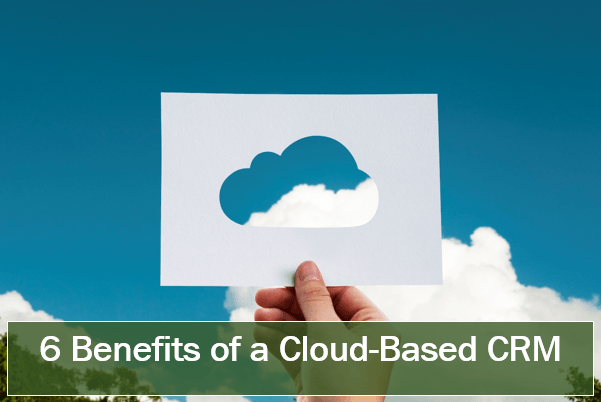

May 20, 2021 - by Payal Vyas
When you’re closing deals and offering unmatched customer experiences, a modern enterprise CRM that gathers all aspects of customer information in a single place is key. Modern CRMs come in a variety of packages, with a multitude of services and capabilities that offer benefits to businesses of all shapes and sizes. One option is a cloud-based CRM because this package offers a number of functionalities needed to remain competitive with the latest features and technology.

A cloud-based CRM (or cloud CRM) is CRM software hosted on the cloud. It can be accessed from any device, enabling users to access the same information at the same time. By offering instant access to real-time insights, it allows you to automate critical processes such as qualifying leads, closing sales deals, and ensuring better customer service for increased customer retention rates.
A cloud-based CRM is different from traditional, on-premises CRMs in many ways. These differences includes:
A deep-rooted fear within most organizations is that a CRM installation is a long and complex process, but that’s no longer true when it comes to a cloud-based CRM. A modern cloud-based CRM can be up and running in no time. All you actually need is an internet connection. Once you sign in online, you can immediately start using the software and make the most of its capabilities. You don’t have to set up hardware, pay for server and software maintenance, have an IT person onsite 24×7, or worry about complex installations, data migrations, or even upgrades – all of this is taken care of by your cloud-CRM service provider.
Unlike traditional on-premises CRM systems that are accessed only from the office during work-hours, around-the-clock accessibility is undeniably the greatest benefit of a cloud-based CRM. By offering access to the system from anywhere – in the office or on the way home and on any device – a desktop, a laptop, a smartphone, or tablet, a cloud-based CRM enables various teams to get the information they need, ultimately improving business process efficiency. From making urgent sales calls on-the-go, to amending a sales proposal, quickly finding a prospect’s phone number, or sending an email to the manager when out of office, a cloud-based CRM offers seamless around-the-clock access to the centralized database.
The most substantial investment with traditional CRM systems was upfront capital expenditures but not anymore. Like other cloud solutions, cloud-based CRMs operate on a pay-as-you-go subscription model. With minimal upfront investment, cloud-based CRMs reduce the chances of risk and enables smaller organizations to achieve economies of scale sooner. Since small businesses are not likely to allocate big sums of money for an enterprise system, these smaller, regular installments help them in leveraging the many capabilities that are available while improving their bottom line.
Contrary to the belief that cloud solutions are not very secure, companies that offer a cloud-based CRM take security very seriously. With advanced automatized backup policies and robust data recovery plans, cloud-based CRMs take cybersecurity to an entirely new level. What’s more, you can further improve data safety and security by using two-step authentication and strong passwords, an important requirement for being GDPR-compliant.
With different organizations having different CRM needs, a cloud-based CRM offers a solution that can be precisely tailored for your needs. While small businesses can start with minimal features that can help them with their current work, they can add more capacity, new features and advanced modules as they grow. Cloud-based CRMs can be instantly updated to satisfy new needs. In addition, by offering 24×7 access to the system, a cloud-based CRM offers employees the flexibility and freedom to do what they need to do when they need to do it.
Traditional, stand-alone products often can’t deliver flexibility and integration that is being demanded by most teams. This is especially true in a small business environment, where information exchange between available technologies is paramount. A cloud-based CRM can be easily integrated with other applications and software, such as e-mail clients and productivity tools, enabling you to seamlessly carry out tasks and achieve end-to-end visibility across the entire sales process.
Cloud solutions are what enable organizations to provide excellent customer experience. A cloud-based CRM helps centralize your customer database and automate key processes giving you instant access to real-time insights and a comprehensive view of your interactions with customers. The benefits of cloud-based CRMs are many: they are easy to install, offer around-the-clock access to information, are cost-effective and secure, flexible, and offer several integration options. By choosing a capable and experienced cloud-based CRM service provider link Synoptek, you can ensure a flexible cloud solution that is tailored to your needs and grows as your business grows.
Interested in beginning your cloud-based CRM journey? Contact us today to discover how Synoptek can get you started.

